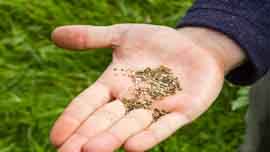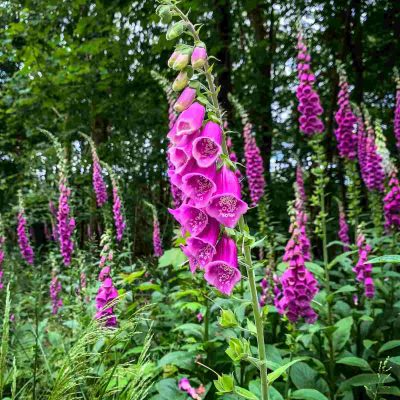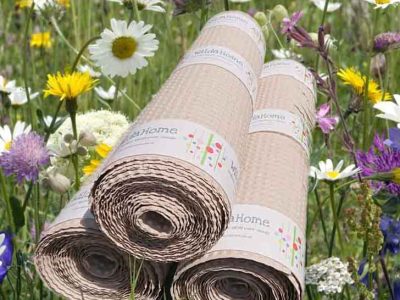Wildflower Seeds for Hedgerows and Banks: Locally Sourced Solutions for Vibrant, Sustainable Growth
Hedgerows and banks are not just boundaries but vital components of the UK’s natural heritage. These green corridors and sloping landscapes provide essential habitats for wildlife, prevent soil erosion, and enhance the beauty of our countryside. By incorporating native wildflower seeds into these areas, we can further amplify their ecological and aesthetic value.
"Why Hedgerows and Banks Are Vital for Wildlife"
The Beauty and Importance of Hedgerows and Banks
Hedgerows act as ‘wildlife highways’, offering food, shelter, and nesting sites for various creatures, from hedgehogs and birds to insects and small mammals. They also act as windbreaks, protecting crops and livestock. Banks, with their varied microclimates, support a diverse range of plant life, contributing to a rich tapestry of biodiversity.
The Role of Wildflowers in Enhancing Natural Borders
Wildflowers transform hedgerows and banks into vibrant ecosystems. Their nectar-rich blooms attract pollinators like bees and butterflies, while their seeds and foliage provide sustenance for birds and other wildlife. They create a dynamic and colourful border that changes with the seasons.
How Wildflowers Add Color and Biodiversity to Sloping Landscapes
Wildflowers bring life and movement to sloping landscapes. Their varied colours and textures create a visually stunning display, softening the hard lines of banks and embankments. They attract a wider range of insects and wildlife, increasing biodiversity and ecological resilience.
Key Factors: Choosing Wildflower Seeds for Hedgerows and Banks
When choosing wildflowers for hedgerows, consider the specific conditions of the site. Factors like light levels (shade tolerance), soil type, and moisture levels will influence which species will thrive. A mix of early and late-flowering varieties ensures a continuous display of colour and supports pollinators throughout the seasons.
Ideal Wildflowers for Slopes, Banks, and Embankments
Select wildflowers with strong root systems for slopes and banks to help stabilise the soil and prevent erosion. Drought-tolerant species are ideal for sunny banks. At the same time, shade-tolerant varieties will flourish in the dappled light beneath hedgerows. Consider low-growing, spreading varieties to create a dense, colourful carpet.
Why Native Wildflowers Are Best Suited for These Areas
Native wildflowers have evolved alongside UK wildlife, forming intricate relationships with local pollinators, insects, and other fauna. They naturally adapt to the local climate and soil conditions, requiring less maintenance and offering more significant ecological benefits than non-native species.
The Benefits of Using Locally Sourced Wildflower Seeds
Locally sourced wildflower seeds are adapted to the specific conditions of your region, ensuring higher germination rates and healthier growth. They promote genetic diversity and strengthen local ecosystems by supporting the pollinators and wildlife that have evolved alongside them.
How Wildahome Ensures Compatibility with UK Hedgerows and Banks
Wildahome specialises in native British wildflower seeds, carefully selected and cultivated for suitability to UK habitats. Our seed mixes are tailored to various soil types, light conditions, and moisture levels, ensuring optimal growth and compatibility with hedgerows and banks.

By working closely with these partners, we ensure high-quality seeds that support biodiversity and thrive in local ecosystems. Our commitment helps create vibrant, pollinator-friendly habitats, restoring the natural beauty of British landscapes.
Supporting Local Ecosystems with Native Seed Varieties
By choosing Wildahome’s native seed varieties, you are actively contributing to preserving the UK’s natural flora and fauna. Our seeds support local ecosystems by providing essential food sources and habitats for pollinators, birds, and other wildlife
Best Wildflowers for Hedgerows and Banks

Shade-Tolerant Wildflowers for Hedgerows
- Red Campion: This vibrant pink wildflower thrives in partial shade and adds colour to hedgerows.
- Foxglove: With its tall, elegant spires of purple flowers, foxglove attracts bees and other pollinators.
- Primrose: These cheerful yellow flowers bloom early in the spring, brightening shaded areas.
Drought-Resistant Wildflowers for Sunny Banks
- Kidney Vetch: This hardy wildflower thrives in dry, sunny conditions and attracts a variety of pollinators.
- Birdsfoot Trefoil: With its bright yellow flowers, birdsfoot trefoil is a valuable food source for bees and butterflies.
- Wild Thyme: This fragrant herb forms a dense mat, perfect for stabilizing soil on sunny banks.
"Preparing Hedgerows and Banks for Wildflower Planting"
Understanding Soil Conditions for Hedgerow Wildflowers
Before planting, assess the soil type and pH level of your hedgerow or bank. Wildflowers prefer well-drained soil, but some species tolerate heavier clay or drier conditions. Amend the soil with organic matter if necessary to improve drainage and fertility.
Managing Drainage on Banks and Slopes
Good drainage is crucial for wildflowers on banks and slopes. Consider adding grit or sand to improve drainage if the soil is heavy clay. If necessary, create shallow trenches or install drainage pipes to prevent waterlogging.
Clearing and Preparing the Area for Optimal Growth
Clear the area of any weeds, grass, or debris before planting. This reduces competition for resources and allows the wildflower seeds to establish themselves. Lightly rake the soil to create a fine tilth for optimal seed germination.
How to Sow Wildflower Seeds on Hedgerows and Banks
- Prepare the soil: Clear the area and amend the soil as needed.
- Sow the seeds: Scatter the seeds evenly over the prepared area.
- Rake the seeds: Lightly rake the seeds into the soil.
- Water the area: Gently water the area to settle the seeds.
- Mulch (optional): Apply a thin layer of mulch to retain moisture and suppress weeds.
Techniques for Preventing Seed Runoff on Banks
Consider using a seed mat or hydroseeding to prevent seed runoff on slopes. These techniques help anchor the seeds in place until they germinate. Alternatively, create shallow furrows along the contours of the bank to trap the seeds and prevent them from washing away.
“The Benefits of Wildflower Seed Mats”

Timing and Maintenance Tips for Long-Term Success
The best time to sow wildflower seeds is in the spring or autumn. Once established, wildflowers require minimal maintenance. Occasional weeding and watering during dry periods may be necessary. Avoid using pesticides or herbicides, which can harm beneficial insects and wildlife. Maintenance.
The Environmental and Aesthetic Benefits of Wildflowers in Hedgerows and Banks
Supporting Pollinators and Local Wildlife
Wildflowers provide essential nectar and pollen for pollinators like bees, butterflies, and hoverflies, which play a crucial role in food production and ecosystem health. They also offer food and shelter for other wildlife, including birds, small mammals, and insects.
Erosion Control and Soil Stabilisation on Banks
The deep root systems of wildflowers help bind the soil, preventing erosion and stabilising banks. This is particularly important in areas prone to landslides or flooding.
Transforming Hedgerows Into Beautiful Wildlife Corridors
Wildflowers transform hedgerows into vibrant wildlife corridors, connecting fragmented habitats and allowing wildlife to move freely across the landscape. They create a beautiful and ecologically valuable addition to any property.
Why Wildahome Is the Perfect Choice for Hedgerows and Banks
Commitment to Local Sourcing and Sustainability
Wildahome is committed to sourcing its seeds locally and sustainably. We work with UK growers to ensure our seeds are adapted to the local climate and support local ecosystems.
Tailored Wildflower Seed Mixes for Diverse Environments
We offer a range of wildflower seed mixes tailored to different soil types, light conditions, and moisture levels. Our team can help you choose the perfect blend for your hedgerow or bank, ensuring optimal growth and biodiversity.
Real-Life Success Stories from Wildahome Customers
Many homeowners, conservationists, and building contractors have successfully used Wildahome’s wildflower seeds to create beautiful, biodiverse hedgerows and banks. Our seeds have helped transform gardens, meadows, and urban areas into thriving wildlife habitats.
FAQs About Wildflower Seeds for Hedgerows and Banks
Can Wildflowers Thrive in Shaded Hedgerows?
Yes, many wildflower species thrive in partial shade. Choose shade-tolerant varieties like red campion, foxglove, and primrose for best results.What Maintenance Is Needed for Banks After Planting?
Once established, wildflowers require minimal maintenance. Occasional weeding and watering during dry periods may be necessary. Avoid using pesticides or herbicides to protect the ecosystem.How Do Wildahome Seeds Support Biodiversity?
Wildahome’s native wildflower seeds support biodiversity by providing essential food sources and habitats for pollinators, birds, and other wildlife. They help create a balanced and resilient ecosystem.When Is the Best Time to Sow Wildflower Seeds?
The best time to sow wildflower seeds is in early spring or autumn. These seasons provide optimal conditions for germination and establishment.Can Wildflower Seeds Be Sown on Sloped Banks?
Yes, wildflower seeds are well-suited for sloped banks. They help prevent soil erosion while adding natural beauty. Use a seed mix specifically designed for banks to ensure success.Do Wildflowers Attract Pollinators?
Absolutely! Wildflowers are a vital food source for bees, butterflies, and other pollinators. Planting them supports declining pollinator populations and enhances biodiversity.Are Wildahome Wildflower Seeds Easy to Grow?
Yes, Wildahome’s wildflower seeds are easy to grow and require minimal care once established. They are selected to thrive in a variety of conditions, making them ideal for hedgerows and banks.

